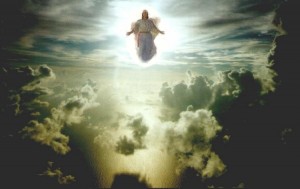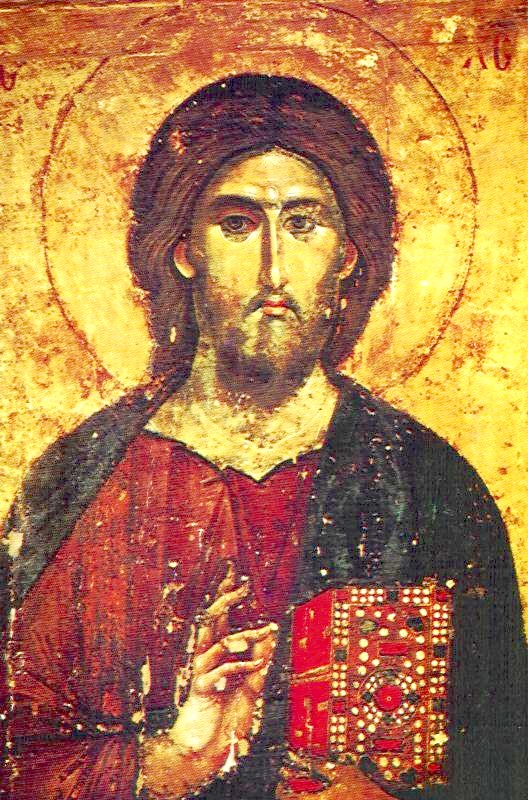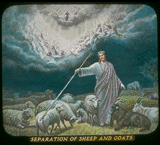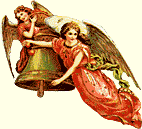And then shall they see the Son of man coming in the clouds with great power and glory. And then shall he send his angels, and shall gather together his elect from the four winds, from the uttermost part of the earth to the uttermost part of heaven (Mk.13.26-7).
 Many of us only associate this with teaching of the Evangelical churches and not something that Catholics believe.
Many of us only associate this with teaching of the Evangelical churches and not something that Catholics believe.
 So let us look at what it is. The Rapture (from the Latin = to take away) is the belief that all Christians, living and dead, will suddenly be taken up body and soul into heaven to be with Jesus, and then the world will end. It is also known as “the second coming” a term used by Justin Martyr in the 2ndC.
So let us look at what it is. The Rapture (from the Latin = to take away) is the belief that all Christians, living and dead, will suddenly be taken up body and soul into heaven to be with Jesus, and then the world will end. It is also known as “the second coming” a term used by Justin Martyr in the 2ndC.
 The first thing we have to ask ourselves is this scriptural? If it is Catholics are bound to believe it. The oldest document we have in the N.T. shows that giant of an apostle, Paul believed in the Rapture. In I Thessalonians 4. 16-17 he informed these early Christians:
The first thing we have to ask ourselves is this scriptural? If it is Catholics are bound to believe it. The oldest document we have in the N.T. shows that giant of an apostle, Paul believed in the Rapture. In I Thessalonians 4. 16-17 he informed these early Christians:
 For the Lord himself shall descend from heaven with a shout, with the voice of the archangel, and with the trump of God: and the dead in Christ shall rise first.
For the Lord himself shall descend from heaven with a shout, with the voice of the archangel, and with the trump of God: and the dead in Christ shall rise first.
 Then we which are alive and remain shall be caught up together with them in the clouds, to meet the Lord in the air: and so shall we ever be with the Lord.
Then we which are alive and remain shall be caught up together with them in the clouds, to meet the Lord in the air: and so shall we ever be with the Lord.
 We should not overlook Paul’s the words with which Paul concluded. “Let us comfort one another with these words.”
We should not overlook Paul’s the words with which Paul concluded. “Let us comfort one another with these words.”
 A few years later when writing to the Corinthian converts to Christianity on the subject of the resurrection of the dead. Paul stated. The body:
A few years later when writing to the Corinthian converts to Christianity on the subject of the resurrection of the dead. Paul stated. The body:
 It is sown in corruption: it is raised in incorruption
It is sown in corruption: it is raised in incorruption
 Is sown in dishonour; it is raised in glory: it is sown in weakness; it is raised in power.
Is sown in dishonour; it is raised in glory: it is sown in weakness; it is raised in power.
…
 But I shall tell you a mystery. We shall not all sleep, but we shall all be changed.
But I shall tell you a mystery. We shall not all sleep, but we shall all be changed.
 In a moment, in the twinkling of an eye, at the last trump: for the trumpet shall sound, and the dead shall be
In a moment, in the twinkling of an eye, at the last trump: for the trumpet shall sound, and the dead shall be  raised incorruptible, and we shall be changed.
raised incorruptible, and we shall be changed.
 For this corruptible must put on incorruption, and this mortal must put on immortality ( ICor. 15. 42-3, 51-3).
For this corruptible must put on incorruption, and this mortal must put on immortality ( ICor. 15. 42-3, 51-3).
 Not only does Paul believe in what is commonly called the Rapture but he also intimated that at the parousia many will be living here on earth. If we now turn to the Matthean gospel written some thirty years later, we shall be informed that the Son of Man will appear from heaven at some future time and all will:
Not only does Paul believe in what is commonly called the Rapture but he also intimated that at the parousia many will be living here on earth. If we now turn to the Matthean gospel written some thirty years later, we shall be informed that the Son of Man will appear from heaven at some future time and all will:
 see the Son of Man coming in the clouds of heaven with power and great glory. And he will send his angels with a great sound of a trumpet, and they will gather his elect from the four winds, from one end of heaven to the other” (Matt. 24. 30- 1).
see the Son of Man coming in the clouds of heaven with power and great glory. And he will send his angels with a great sound of a trumpet, and they will gather his elect from the four winds, from one end of heaven to the other” (Matt. 24. 30- 1).
 The first of these verses is based on a passage from Daniel 7. 13-14.
The first of these verses is based on a passage from Daniel 7. 13-14.
 I saw in the night visions, and behold, one like the Son of Man came with the clouds of heaven, and came to the Ancient of days, and they brought him near before him.
I saw in the night visions, and behold, one like the Son of Man came with the clouds of heaven, and came to the Ancient of days, and they brought him near before him.
 And there was given him dominion, and glory, and a kingdom, that all people, nations, and languages, should serve him: his dominion is an everlasting dominion, which shall not pass away, and his kingdom that which shall not be destroyed.
And there was given him dominion, and glory, and a kingdom, that all people, nations, and languages, should serve him: his dominion is an everlasting dominion, which shall not pass away, and his kingdom that which shall not be destroyed.
 The other verse is based on a verse from Zechariah. “Ho, ho come forth, and flee from the land of the north, saith the Lord: for I spread you abroad as the four winds of the heaven, says the Lord (Zec. 2.6).
The other verse is based on a verse from Zechariah. “Ho, ho come forth, and flee from the land of the north, saith the Lord: for I spread you abroad as the four winds of the heaven, says the Lord (Zec. 2.6).
 It is interesting that here the Son acts on His own initiative and authority, not that of the Father. Only those who have been chosen will be gathered as had been intimated in the ending of the parable of the wedding garment told a couple of chapters previously. “For many are called, but few are chosen” (Matt. 22.14).
It is interesting that here the Son acts on His own initiative and authority, not that of the Father. Only those who have been chosen will be gathered as had been intimated in the ending of the parable of the wedding garment told a couple of chapters previously. “For many are called, but few are chosen” (Matt. 22.14).
 Matthew no doubt took this passage almost verbatim from Mark.
Matthew no doubt took this passage almost verbatim from Mark.
 And then shall they see the Son of man coming in the clouds with great power and glory. And then shall he send his angels, and shall gather together his elect from the four winds, from the uttermost part of the earth to the uttermost part of heaven (Mk.13.26-7).
And then shall they see the Son of man coming in the clouds with great power and glory. And then shall he send his angels, and shall gather together his elect from the four winds, from the uttermost part of the earth to the uttermost part of heaven (Mk.13.26-7).
 The separating of the righteous from the unrighteous at the Last Judgment is also the intent of the parable of the separation of the sheep and goats (Matt. 25. 31 – 46). One only has to recall Michelangelo’s depiction of it in the Sistine chapel to realise how grimly serious is the day of reckoning. The message of the parable surely is how faithful we have been to Christ and His teaching of being compassionate to the outcast and needy. In other words, have we fulfilled the works of mercy?
The separating of the righteous from the unrighteous at the Last Judgment is also the intent of the parable of the separation of the sheep and goats (Matt. 25. 31 – 46). One only has to recall Michelangelo’s depiction of it in the Sistine chapel to realise how grimly serious is the day of reckoning. The message of the parable surely is how faithful we have been to Christ and His teaching of being compassionate to the outcast and needy. In other words, have we fulfilled the works of mercy?
When shall it happen?
Obviously St. Paul believed it would happen during his own life time. Yet the Matthean advice is one should not speculate. “But of that day and hour no one knows, not even the angels in heaven, nor the Son, but the Father only” (Matt. 24.36). This seems a contradiction of the above passage from Matthew for here it is made very clear that only the Father knows of that day when all will be gathered up. The significance of this verse is manifested a few verses later when Christians are directed to watch for they do not know when that day will come (v.42). It is also repeated in the account of the parable of the ten virgins (25.13). So it would seem that we should not bother ourselves about when but how we shall meet the Lord at His second coming.
 Christians can take great comfort from the Johannine gospel. In His last discourse before His triumphant death, our Lord told us He is the way to the Father for those who believe in Him. They are amongst the most comforting words in Scripture.
Christians can take great comfort from the Johannine gospel. In His last discourse before His triumphant death, our Lord told us He is the way to the Father for those who believe in Him. They are amongst the most comforting words in Scripture.
First there is the comfort in 14. 1- 6.
 Do not let your heart be troubled; believe in God, believe also in Me. In My Father's house are many dwelling places; if it were not so, I would have told you; for I go to prepare a place for you. If I go and prepare a place for you, I will come again and receive you to Myself, that where I am, there you may be also. And you know the way where I am going." Thomas said to Him, "Lord, we do not know where You are going, how do we know the way?" Jesus said to him, "I am the way, and the truth, and the life; no one comes to the Father but through Me."
Do not let your heart be troubled; believe in God, believe also in Me. In My Father's house are many dwelling places; if it were not so, I would have told you; for I go to prepare a place for you. If I go and prepare a place for you, I will come again and receive you to Myself, that where I am, there you may be also. And you know the way where I am going." Thomas said to Him, "Lord, we do not know where You are going, how do we know the way?" Jesus said to him, "I am the way, and the truth, and the life; no one comes to the Father but through Me."
 This is a passage, I think, we should recall often on our pilgrimage. Our dear Lord has gone before us to prepare for our coming to Him. What a joyful thought when we feel weighed down by things and events of this world. Jesus tells us we know the way. But do we know it? Or are we like Thomas, doubting Thomas, and blurt out that we do not the way. What is that way? We have been told that Jesus himself is the Way and not only the Way but the Truth and the Life. So the way to our heavenly home is by loving our Lord deeply and following His way of life and teaching to do the will of the Father. We know that His way is to love. That should suffice the faithful.
This is a passage, I think, we should recall often on our pilgrimage. Our dear Lord has gone before us to prepare for our coming to Him. What a joyful thought when we feel weighed down by things and events of this world. Jesus tells us we know the way. But do we know it? Or are we like Thomas, doubting Thomas, and blurt out that we do not the way. What is that way? We have been told that Jesus himself is the Way and not only the Way but the Truth and the Life. So the way to our heavenly home is by loving our Lord deeply and following His way of life and teaching to do the will of the Father. We know that His way is to love. That should suffice the faithful.
Secondly there is oneness with the Father vv. 7- 15
 If you had known Me, you would have known My Father also; from now on you know Him, and have seen Him." Philip said to Him, "Lord, show us the Father, and it is enough for us." Jesus said to him, "Have I been so long with you, and yet you have not come to know Me, Philip? He who has seen Me has seen the Father; how can you say, 'Show us the Father'? Do you not believe that I am in the Father, and the Father is in Me? The words that I say to you I do not speak on My own initiative, but the Father abiding in Me does His works. Believe Me that I am in the Father and the Father is in Me; otherwise believe because of the works themselves. Truly, truly, I say to you, he who believes in Me, the works that I do, he will do also; and greater works than these he will do; because I go to the Father. Whatever you ask in My name, that will I do, so that the Father may be glorified in the Son. If you ask Me anything in My name, I will do it. If you love Me, you will keep My commandments.
If you had known Me, you would have known My Father also; from now on you know Him, and have seen Him." Philip said to Him, "Lord, show us the Father, and it is enough for us." Jesus said to him, "Have I been so long with you, and yet you have not come to know Me, Philip? He who has seen Me has seen the Father; how can you say, 'Show us the Father'? Do you not believe that I am in the Father, and the Father is in Me? The words that I say to you I do not speak on My own initiative, but the Father abiding in Me does His works. Believe Me that I am in the Father and the Father is in Me; otherwise believe because of the works themselves. Truly, truly, I say to you, he who believes in Me, the works that I do, he will do also; and greater works than these he will do; because I go to the Father. Whatever you ask in My name, that will I do, so that the Father may be glorified in the Son. If you ask Me anything in My name, I will do it. If you love Me, you will keep My commandments.
 Our Lord teaches us to do the will of the Father. Yet Thomas was not the only doubting one that night. Philip wanted Jesus to show them the Father. Jesus must have been dumbfounded by such a question when He had spent so much of His teaching explaining to the disciples that He has come from the Father, that the Father and He are one and He will return to His Father. To see the Lord Jesus is to see the Father. His words to Mary Magdalen were go and tell the disciples that I ascend to my Father and your Father” (Jn.20.17). To do the will of the Father is to live as Jesus showed.
Our Lord teaches us to do the will of the Father. Yet Thomas was not the only doubting one that night. Philip wanted Jesus to show them the Father. Jesus must have been dumbfounded by such a question when He had spent so much of His teaching explaining to the disciples that He has come from the Father, that the Father and He are one and He will return to His Father. To see the Lord Jesus is to see the Father. His words to Mary Magdalen were go and tell the disciples that I ascend to my Father and your Father” (Jn.20.17). To do the will of the Father is to live as Jesus showed.
 Thirdly comfort will come from the Paraclete, that is, the role of the Spirit vv. 16 - 21
Thirdly comfort will come from the Paraclete, that is, the role of the Spirit vv. 16 - 21
 I will ask the Father, and He will give you another Helper, that He may be with you forever; that is the Spirit of truth, whom the world cannot receive, because it does not see Him or know Him, but you know Him because He abides with you and will be in you. I will not leave you as orphans; I will come to you. After a little while the world will no longer see Me, but you will see Me; because I live, you will live also. In that day you will know that I am in My Father, and you in Me, and I in you. He who has My commandments and keeps them is the one who loves Me; and he who loves Me will be loved by My Father, and I will love him and will disclose Myself to him.
I will ask the Father, and He will give you another Helper, that He may be with you forever; that is the Spirit of truth, whom the world cannot receive, because it does not see Him or know Him, but you know Him because He abides with you and will be in you. I will not leave you as orphans; I will come to you. After a little while the world will no longer see Me, but you will see Me; because I live, you will live also. In that day you will know that I am in My Father, and you in Me, and I in you. He who has My commandments and keeps them is the one who loves Me; and he who loves Me will be loved by My Father, and I will love him and will disclose Myself to him.
Jesus knew that His disciples without Him could never know the Father. So He did not want to trouble their hearts too much. His great comfort to them was to send the Paraclete, the One who will stand beside them for that is what the word means. They are not orphans but children of God who will be led and taught by their teacher, the Spirit. It will be that Spirit that will teach them the Way as well as the Truth and Life. The Paraclete will lead them always to the Father by keeping the commandments of which the main one is to love God and neighbour.
 So what does Scripture teach us? As Christians we do not have to waste time trying to work out when the Rapture or parousia will be. Rather we spend our time knowing that the Lord has gone before to prepare a place for us and so our hearts are joyful and thankful that on that day we shall be raised up and our corruptible bodies shall be made incorruptible and all the old has passed away.
So what does Scripture teach us? As Christians we do not have to waste time trying to work out when the Rapture or parousia will be. Rather we spend our time knowing that the Lord has gone before to prepare a place for us and so our hearts are joyful and thankful that on that day we shall be raised up and our corruptible bodies shall be made incorruptible and all the old has passed away.
The 16th century poet, Edmund Spenser, described that place Jesus has prepared for us perfectly in his poem, An Hymne of Heavenly Beautie. Last century the composer William Harris set it to music, just as exquisite as the poem in Faire is the heavens. As I listen to it, I try to envisage that place where “happy souls … behold the glorious face of the Divine” and where “bright Cherubins” and “eternall burning Seraphins” do not rest in the eternal presence. This beauty and fairness is beyond the words of mortal beings. Yet waiting for us is this “endlesse perectnesse”.
Here is Spenser’s poem.
Faire is the heaven where happy soules have place
In full enjoyment of felicitie;
Whence they do still behold the glorious face
Of the Divine, Eternall Majestie;
Yet farre more faire be those bright Cherubins
Which all with golden wings are overdight.
And those eternall burning Seraphins
Which from their faces dart out fiery light;
Yet fairer than they both and much more bright,
Be th’ Angels and Archangels
Which attend on God's owne person without rest or end.
These then in faire each other farre excelling
As to the Highest they approach more neare,
Yet is that Highest farre beyond all telling
Fairer than all the rest which there appeare
Though all their beauties joynd together were;
How then can mortal tongue hope to expresse
The image of such endlesse perfectnesse?



